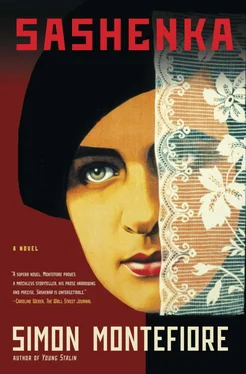I misjudged this morally corrupt woman. I thought she was a decent Soviet woman. She teaches Soviet women how to be housewives. She’s the wife of a top Chekist. Who knows what secrets she chatters about? She behaves like a streetwalker. Comrade Beria, perhaps we should check her out. J. St.
“You know what ‘checking out’ means?” asked Maxy. “It means arrest them. You see how, in a few accidental steps, this reached Stalin?”
Katinka shook her head, her heart pounding in sympathy. If it hadn’t been for Stalin’s visit, if it hadn’t been for Sashenka’s affair, if it hadn’t been for Vanya’s jealousy…
“Isn’t there anything else in the file?” she asked.
Maxy sighed. “No, not in this archive. But the Russian State Archive of Special Secret Political-Administrative Documents off Mayakovsky Square is filled with Stalin’s papers and somewhere in there, one day, future generations may find out what happened, if they care. But it’s closed. These are all the records we can read. Oh, except for one small thing.” He picked up Stalin’s note again and pointed to the top right-hand corner, where, in small letters, his red crayon had written these words: Bicho to curate .
“What does that mean?” Katinka asked.
“I thought I knew everything about the Stalin era,” said Maxy, “but for once I can’t work it out.”
Katinka swayed with exhaustion and sadness. “I don’t think I’ll ever find Sashenka or little Carlo,” she whispered. “Poor Roza, how am I going to tell her?”
Outside the archive, the streets were already dark. Still shocked by what they’d found, Maxy and Katinka parted awkwardly like two teenagers after an unsatisfactory date. As Maxy rode away, Katinka walked slowly up the dark hill toward the glitzy neon lights of Tverskaya just beyond Prince Dolgoruky’s statue. Slowing to adjust the way her bag was hanging over her shoulder, she became aware that someone was walking much too close to her.
She quickened her step but so did the shadow. She slowed to let him overtake but he slowed too. She was suddenly frightened: was it the KGB? Or a Chechen mugger? Then the figure gathered up a wad of phlegm in his mouth and launched it in a phosphorescent, light-catching arc toward the gutter.
“Kuzma!” she gasped. “What are you—”
Without a word he pulled her aside, behind the statue, where there was no one around. He was holding a big canvas bag, which he opened to reveal the marmalade jazz cat and its kitten. “Cozy!” he blurted out in his queer, unbroken voice.
“Very cozy,” Katinka said, still concerned. What did he have in mind for her?
Kuzma reached into the cat bag and pulled out an old-fashioned yellow envelope, closed with red string, which he shoved into her hands, glancing around as he did so with comical vigilance—even though she knew this was no joke. He was risking his life.
“For you,” he muttered.
“But what is it?”
“You read it, you see!” Peering around again, he started to move away from her up toward Tverskaya.
“Kuzma! Wait! I want to thank you properly!” Kuzma shrank from her like a vampire before holy water but she grabbed his wrist. “One question. When it says ‘the Central Committee asked for the files,’ where are they now? Can I see them?”
Kuzma walked back, and stood so close his unshaven muzzle pricked her ear. He pointed into the earth, into the cellars, the dungeons, the graves, and only a hiss came out of him.
“So how will I ever know what happened?”
Kuzma shrugged but then he pointed up the hill. “Better to sing well as a goldfinch than badly as a nightingale.” And then he marched stiffly away, disappearing into the blurred greyness of Tverskaya’s rush-hour crowds.
The envelope burned her hands. Katinka could hardly restrain herself from opening it but she tried to stay calm. She glanced around to see if she was being followed but decided that if the KGB wanted to follow her she would never know about it anyway.
She couldn’t wait to reach her hotel room so she crossed the road to the sleazy foyer of the Intourist Hotel, a hideous seventies construction of glass and concrete. Its ceiling, made up of what appeared to be white polystyrene squares, was low; its floor was a faded, frayed burgundy “carpet” and the security staff at its brown, padded-vinyl desk were aggressive, lantern-jawed Soviet “bulls.”
But the place seethed like a souk. One-armed bandits rumbled and whirred, and garish whores sat about on orange sofas. As one of the security thugs approached her, Katinka pointed at the whores and he shrugged: he’d collect his share later. Sitting on a foam sofa next to two booted, stockinged girls with bare, bruised white thighs, she offered them both a cigarette. Each of them grabbed one: the first put it in her handbag, the other in her stocking top.
Katinka lit up her own, inhaled and then tore open the envelope. Inside were a few trinkets and a wad of photocopied documents. The first was dated May 1953, two months after Stalin’s death:
To all case officers: Palitsyn/Zeitlin Case
For security reasons, relatives enquiring about sentences of abovementioned state criminals are to be informed that the prisoners were resentenced after a ten-year term in Gulags.
Signed: I. V. Serov, Chairman, State Security Committee (KGB)
Anger and confusion coursed through Katinka, followed by a sinking sadness. Everything she had so far learned from Mouche and the KGB archives was a callous lie. She must have paled because one of the prostitutes leaned over and asked gently: “Your test results, love? Bad news?”
“Something like that,” said Katinka, her forehead prickly with sweat.
“Tough, tough, but we survive,” said the prostitute, lighting up and turning back to her friend.
Katinka looked again at the typed pages.
Sitting of Military Tribunal, office of the Narkom L. P. Beria, at Special Object 110, 2:30 a.m. 22 January 1940. Trial of Accused Alexandra “Sashenka” Zeitlin-Palitsyn (Comrade Snowfox).
Chairman of the Military Tribunal of the Supreme Court Vasily Ulrikh presiding in person.
Katinka leafed to the end, looking for the sentencing—but there was that maddening note again: Send documents on Palitsyn case to Central Committee.
Then she started to read Sashenka’s trial notes—and what she read shocked her so deeply that she stuffed the papers back in the envelope and ran out of the hotel into the street, turning right and heading down the hill toward the Kremlin, its eight red stars glowing high above her through the hazy rhapsody of a spring night.
“You’ve gone too far this time!” said Mariko, barely raising her voice, which made the implied threat all the more powerful.
Marshal Satinov sat in his high chair in the elegant, breezy sitting room with an oxygen mask held onto his face by elastic and a large oxygen cylinder on wheels beside him. He appeared to have shrunk in just a few days, and his blinking eyes followed Katinka’s every move.
“Please, let me talk to your father for one minute,” said Katinka, breathless and flushed with running. “I’ve so much to tell him and he himself asked me to let him know what I found…”
She fixed her eyes, imploringly, onto Satinov’s sharp orbs with their half-closed lids. At first they showed nothing. But then they seemed to twinkle and the old man wrenched off his oxygen mask. “Oh Mariko, stop fussing.” He spoke with difficulty. “Bring us tea.” Mariko sighed loudly and stomped out. “How did you get in, girl?”
“Someone let me in through the street door and then I found your door ajar.”
Satinov absorbed this. “Fate, that’s what it is. Don’t forget that’s why you’re here.” He gave a skull-like smile.
Читать дальше












